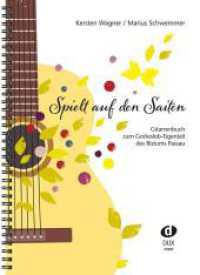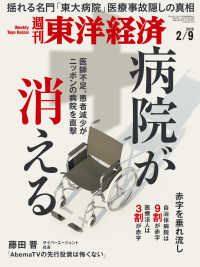- ホーム
- > 洋書
- > ドイツ書
- > Social Sciences, Jurisprudence & Economy
- > Education Science / Pedagogic
- > didactics, methodics, school education
Full Description
This volume examines the unique characteristics of akshara orthography and how they may affect literacy development and problems along with the implications for assessment and instruction. Even though akshara orthography is used by more than a billion people, there is an urgent need for a systematic attempt to bring the features, research findings, and future directions of akshara together in a coherent volume. We hope that this volume will bridge that gap.
Akshara is used in several Indic languages, each calling it by a slightly different name, for example 'aksharamu', in Telugu, 'akshara' in Kannada, and 'akshar' in Hindi. It is the Bhrami-derived orthography used across much of the Indian subcontinent. There is a growing body of research on the psycholinguistic underpinnings of learning to read akshara, and the emerging perspective is that akshara, even though classified as alphasyllabaries, abugida, and semi-syllabic writing systems, is neither alphabetic norsyllabic. Rather, akshara orthography is unique and deserves to be a separate classification and needs further investigation relating to literacy acquisition in akshara. The chapters in this volume, written by leading authors in the field, will inform the reader of the current research on akshara in a coherent and systematic way.
Contents
Introduction; R. M. Joshi & Catherine McBride.- Indic Scripts: History, Typology, Study; Peter T. Daniels.- What is an Akṣara? Keerthi Ramanujan and Brendan Stuart Weekes.- Part II. Akshara Orthographies: A brief description.- Orthographic knowledge, reading and spelling development in Tamil: The first three years; Sonali Nag and Balambigai Narayanan.- Literacy acquisition in the Malayalam orthography: Cognitive/linguistic influences within a multilingual context; Mimisha Nesan, Amir Sadeghi and John Everatt.- Spelling Acquisition in Akshara and English; Pooja Nakamura, Joshi, R. M., & Ji, X.- Akshara processing in Telugu depends on syllabic and phonemic sensitivity: Preliminary evidence from normal hearing and hearing impaired children; Vasanta Duggirala.- Multiliteracy in Akshara and Alphabetic Orthographies: the case of Punjabi, Hindi and English learners in primary schools in Punjab; Seema Gautam, John Everatt, Amir Sadeghi, and Brigid McNeill.- Spelling and reading words in Bengali: The role of distributed phonology; Shruti Sircar and Sonali Nag.- Assamese phonology-orthography correlates with reference to learnability and literacy issues; Hemanga Dutta.- Reading and Writing Sinhala; M.A.D.K. Wijaythilake & R. Parrila.- Learning to Read and Write in Thai; Heather Winskel and Theeraporn Ratitamkul.- Part III. Assessment.- The Assessment of Emergent and Early Literacy Skills in the Akshara languages; Shaher Banu Vagh and Sonali Nag.- Dyslexia Assessment for Languages of India (DALI); Nandini Singh.- Part IV. Instruction.- Language-focused Instruction for Literacy Acquisition in Akshara-based Languages; Chandrika Mathur & Sonali Nag.- Challenges in learning Akshara orthographies for second language learners; Adeetee Bhide & Charles Perfetti.- Part V. Research Implications.- Learning to read in their heritage language: Hindi-Englisryh speakers reading two different orthographies; Amna Mirza and Alexandra Gottardo.- Cross-modal processing of orthography-phonology interface in Hindi-English bilinguals; Ramesh Kumar Mishra.- Language and Literacy Practices that Influence Bilingual and Bi-Literate Acquisition in L1 Kannada and L2 English in Bangalore, India; Sunaina Shenoy and Richard K. Wagner.








